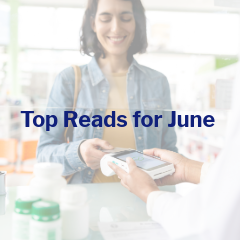
The top three Prescribed Perspectives articles downloaded by health systems in June.
Patient care can be positively influenced when a health system specialty pharmacy has access to critical orphan drugs.
By
Date
December 01, 2023
Read time:
3 minutes

“There’s a strong overlap between specialty pharmacy and orphan drugs,” explains Lindsey DeMarrais, PharmD, MS, Managing Pharmacist Consultant at McKesson Health Systems. Orphan drugs, which are developed specifically to prevent, diagnose, treat, or otherwise address rare disease states – meaning those affecting fewer than 200,000 people – are often high-touch, high-cost medications – much like specialty drugs. Because of this, many orphan drugs are formally classified as specialty products. In fact, as much as 87% of orphan drug spend in recent years has fallen within the specialty category.1 And much like other specialty drugs, whether a health system specialty pharmacy has access to orphan drugs is critical for driving positive patient outcomes and, in some cases, can boost the financial health of the system itself.
For any patient, having convenient access to necessary medications within the continuum of care at their health system and open communication with their care team can play an important role in their treatment course and clinical outcome. For those patients diagnosed with a rare disease – like those orphan drugs are designed to treat – these pillars of positive influence can be even more critical. “Because orphan disease states are often highly complex, and because these patients can be carrying a particularly heavy disease burden, keeping everything internal is ideal,” says DeMarrais, “and that includes dispensing the orphan drugs prescribed by their hospital provider through the health system specialty pharmacy.” This allows the health system – who knows the patient and has the expertise in managing a rare disease state – to maintain connectivity through the entire course of care, keeping everything contained in one environment and reducing the risk of something being missed – whether by interrupted communication, an unnoticed potential drug interaction, or otherwise.
In the scenario that a patient’s health system pharmacy does not have access to their prescribed orphan drug, they must have their prescription filled by an outside specialty pharmacy. In many cases, there are just a handful of pharmacies in the country with a certain orphan drug in their formulary – as few as a single pharmacy for some medications – meaning patients have little choice but to fill their prescription through a pharmacy that is outside their health system. This may see the patient communicating with an out-of-state call center about their medications rather than their own care team, the latter of whom would have a more complete picture of their health history and management and be able to provide beneficial context to the unique patient and process. “Anytime the health system has access to the necessary and prescribed medication, you’re allowing the patient to interact directly with their care team and, ultimately, being able to meet the needs of that patient,” DeMarrais reiterates. “Not only that, but medication adherence dramatically improves when patients can have their prescription filled immediately by the health system pharmacy.”
Another consideration in understanding the value of access to orphan drugs is the added revenue that orphan drugs dispensed through the specialty pharmacy may contribute to a health system’s bottom line. And while 340B discounts do not apply to orphan drugs for “ACA covered entities” (critical access, rural referral, sole community, and cancer hospitals), some manufacturers offer discretionary 340B-like discounts on these medications that often go underutilized by health systems.2
Orphan drug access is controlled by manufacturers and granted through an extensive vetting process that assesses operational logistics, data and reporting, accreditation, and more. Moreover, many orphan drugs are released as exclusive or limited distribution drugs, meaning manufacturers grant access to just 1-4 pharmacies.3 This can make it challenging for the average health system specialty pharmacy to gain access compared with PBM-owned pharmacies. “But it can be done – and it should be done,” DeMarrais says. “Our Professional and Advisory Services team helps McKesson Health Systems customers build or expand their specialty pharmacy and provides the tools, solutions, and expertise necessary to gain access to these orphan drugs, as well as secure orphan drug discounts, that can be life-changing – or even life-saving – for the patients that need them.”
To learn more about how McKesson can help you achieve more for your business of pharmacy and advance patient outcomes, contact our McKesson Health Systems experts today.
1Orphan Drugs in the United States (Part one). Institute Report. IQVIA. October 17, 2018.
2340B Drug Pricing Program: Orphan Drugs. Health Resources & Services Administration (HRSA). Last reviewed September 2023.
3 Vanscoy G, Seymore B, Kohli N, Patel J, Ogurchak J. The Reemergence of Specialty Pharmacy. J Manag Care Spec Pharm. 2020 Mar;26(3):234-235. doi: 10.18553/jmcp.2020.26.3.234. PMID: 32105171; PMCID: PMC10391222.